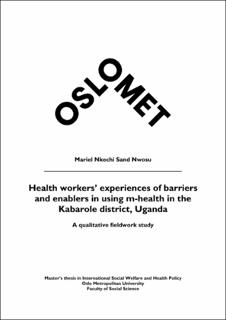| dc.description.abstract | This thesis aims to explore health workers' experiences with barriers and enablers in using m-health (mobile health) in health care service delivery in the Kabarole district of Western Uganda. The rapid increase of mobile phones in Uganda over the last decades offers many opportunities in providing primary health care services to those who need it most. Using m-health systems can increase access to quality and equitable health care. I evaluate two m-health systems: the mTrac system (mobile tracking) used for disease surveillance and the Enhance Visual Assessment (EVA) System, used for consultation between health care workers to diagnose cervical cancer.
The results are based on a three-month-long qualitative fieldwork study in the Kabarole district of the impact of m-health systems taken on the ground. The fieldwork gave me a better understanding of the pressure put on the health care system in a country with high birth rates combined with few resources. Lack of drugs and physicians and cases with epidemic diseases such as HIV/AIDS and malaria are putting pressure on the health care system, combined with unstable drug-stock levels. Doing fieldwork, semi-structured interviews, and participant observations in the natural setting of the participants gives you access and understanding of a social problem that is valuable, which contributed to the study's trustworthiness.
This thesis focuses on the two m-health systems' ability to promote Universal Health Care (UHC), a highly prioritized objective within the World Health Organization (WHO). Using the EVA system could help promote diagnosis for vulnerable groups such as women with HIV, who are more exposed to cervical cancer. Barriers of incomplete data when using mTrac could be met with proper training. While lack of drugs to enhance health equity met some barriers of incomplete data through the mTrac system, mTrac seems to have enabled more re-distribution of drugs between health service deliveries and reduced the drug stock-outs. Though drug stock-outs are not solved, and the barriers when diagnosing are not properly met, the use of the two m-health systems could come closer to UHC. | en_US |
